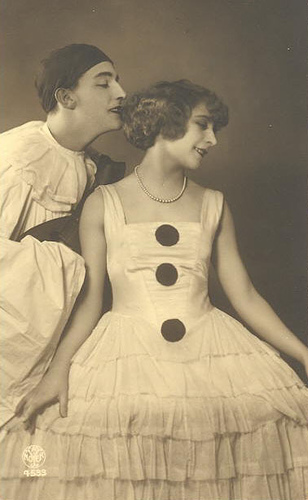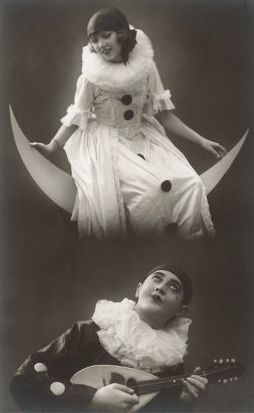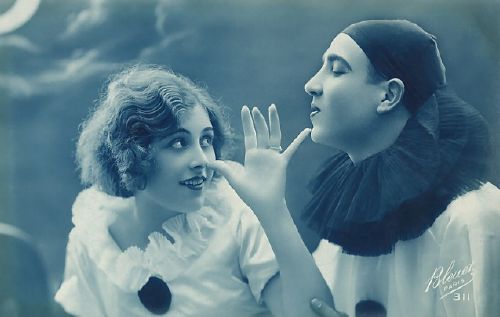|
Pierrot and Pierrette
Pierrot is a stock character of French pantomime. He is usually depicted wearing a loose, white tunic. The noticeable feature of Pierrot's behaviour is his naivete, he is seen as a fool, always the butt of pranks, yet nonetheless trusting. Pierrot is also portrayed as moonstruck, distant and oblivious to reality. Pierrette is Pierrot's pantomime counterpart: Pierrette is the lovable little French pantomime figure, dressed usually in a ballet skirt and bright peasant waistcoat and smart cocked hat. The pair were popular in street and carnival shows. She is a tender-hearted and wise little foil for the Pierrot who plays opposite her in fanciful and deilightful whimsical stories. Her name suggests a spirit loving, tender, comforting, but saucy, gay, and smart.
Though there were countless variations in their mostly improvised plays, the following would be a typical story:
Pierrot and Pierrette,
A Ballet In One Act by John Craton
Scene: A park
 The ballet begins with a traditional Harlequinade that acts as a sort of play within a play, as it is a comedy being performed in a 19th-century European park. It incorporates all the standard farcical elements of a classic Harlequinade.
The Harlequinade over, the “audience” exits and the sun goes down. A lamplighter enters to light the park lamp. The moon appears in the sky, large and round, and the lamplighter briefly dances to the moon. Pierrot then wanders lovesick onto the stage and watches the other performers wend their way home. He sees Pierrette, whom he secretly loves, but she is leaving arm in arm with Harlequin. With no one to go home to, he lies down on the bench to sleep. The Fée rêveuse (Dream Fairy) enters along with a number of Fireflies. They circle round Pierrot until the Fée rêveuse sends him to sleep and gives him a pleasant dream. The ballet begins with a traditional Harlequinade that acts as a sort of play within a play, as it is a comedy being performed in a 19th-century European park. It incorporates all the standard farcical elements of a classic Harlequinade.
The Harlequinade over, the “audience” exits and the sun goes down. A lamplighter enters to light the park lamp. The moon appears in the sky, large and round, and the lamplighter briefly dances to the moon. Pierrot then wanders lovesick onto the stage and watches the other performers wend their way home. He sees Pierrette, whom he secretly loves, but she is leaving arm in arm with Harlequin. With no one to go home to, he lies down on the bench to sleep. The Fée rêveuse (Dream Fairy) enters along with a number of Fireflies. They circle round Pierrot until the Fée rêveuse sends him to sleep and gives him a pleasant dream.
In the dream sequence, Pierrot sits up and sees Pierrette coming to him. The two then have a long pas de deux until Harlequin and his Entourage invade even his dream. Isabel (Pierrette’s older guardian sister) also enters the dream to separate Pierrette from her two suitors. Isabel sends Harlequin away and then takes Pierrette’s hand and leads her offstage. (N.B. Isabel is secretly in love with Harlequin, so her action of always thwarting Harlequin’s advances toward Pierrette are both to protect her sister and also to try to win him for herself.) At the dream’s conclusion Pierrot awakes, stretches, and then sees Pierrette sitting in the cradle of the moon.
 Pierrot takes up his mandolin and begins serenading Pierrette, endeavoring to win her affection. Soon, however, Harlequin with his Entourage enter to make light of Pierrot’s intentions. Boldly, Pierrot plucks a rose and dramatically presents it to Pierrette. Just as she reaches out to take it Harlequin wields his wand and makes Pierrette and the moon disappear. Pierrot searches frantically for her but cannot find her. Harlequin then mockingly points to the sky where a full moon has now appeared. Pierrot tries to reach out and take it but cannot. Mockingly, the Entourage brings out a ladder for him. Pierrot climbs the ladder, but just as he reaches the moon it eclipses. He descends the ladder empty handed and very distraught. Tauntingly, Harlequin then brings Pierrette out from the shrubbery and dances with her to indicate his victory over Pierrot. At this Pierrot is very distraught and sits on the bench, quietly weeping. However, Isabel comes out once again and breaks up the dancing couple, signalling “No, no, no!” to Pierrette. Finally Harlequin fully notices Isabel in her own right, shrugs, and realizing he won’t win Pierrette tonight, dances with Isabel instead. The two dance offstage. Alone with Pierrot, Pierrette notices him on the bench and goes over to him to see why he is so sad. Pierrot looks up at her and hands her a large red heart. Pierrette takes the heart, looks first at it and then at Pierrot, and clutches the heart to her breast. She reaches out her hand to Pierrot. He takes her hand, rises, and the two lovers stand hand in hand and gaze at the moon. Curtain. Pierrot takes up his mandolin and begins serenading Pierrette, endeavoring to win her affection. Soon, however, Harlequin with his Entourage enter to make light of Pierrot’s intentions. Boldly, Pierrot plucks a rose and dramatically presents it to Pierrette. Just as she reaches out to take it Harlequin wields his wand and makes Pierrette and the moon disappear. Pierrot searches frantically for her but cannot find her. Harlequin then mockingly points to the sky where a full moon has now appeared. Pierrot tries to reach out and take it but cannot. Mockingly, the Entourage brings out a ladder for him. Pierrot climbs the ladder, but just as he reaches the moon it eclipses. He descends the ladder empty handed and very distraught. Tauntingly, Harlequin then brings Pierrette out from the shrubbery and dances with her to indicate his victory over Pierrot. At this Pierrot is very distraught and sits on the bench, quietly weeping. However, Isabel comes out once again and breaks up the dancing couple, signalling “No, no, no!” to Pierrette. Finally Harlequin fully notices Isabel in her own right, shrugs, and realizing he won’t win Pierrette tonight, dances with Isabel instead. The two dance offstage. Alone with Pierrot, Pierrette notices him on the bench and goes over to him to see why he is so sad. Pierrot looks up at her and hands her a large red heart. Pierrette takes the heart, looks first at it and then at Pierrot, and clutches the heart to her breast. She reaches out her hand to Pierrot. He takes her hand, rises, and the two lovers stand hand in hand and gaze at the moon. Curtain.
|
Note: The above synopsis is by composer John Craton.
Visit his website to learn more about his compositions,
and you can download mp3's of this very charming work there.
|



 The ballet begins with a traditional Harlequinade that acts as a sort of play within a play, as it is a comedy being performed in a 19th-century European park. It incorporates all the standard farcical elements of a classic Harlequinade.
The Harlequinade over, the “audience” exits and the sun goes down. A lamplighter enters to light the park lamp. The moon appears in the sky, large and round, and the lamplighter briefly dances to the moon. Pierrot then wanders lovesick onto the stage and watches the other performers wend their way home. He sees Pierrette, whom he secretly loves, but she is leaving arm in arm with Harlequin. With no one to go home to, he lies down on the bench to sleep. The Fée rêveuse (Dream Fairy) enters along with a number of Fireflies. They circle round Pierrot until the Fée rêveuse sends him to sleep and gives him a pleasant dream.
The ballet begins with a traditional Harlequinade that acts as a sort of play within a play, as it is a comedy being performed in a 19th-century European park. It incorporates all the standard farcical elements of a classic Harlequinade.
The Harlequinade over, the “audience” exits and the sun goes down. A lamplighter enters to light the park lamp. The moon appears in the sky, large and round, and the lamplighter briefly dances to the moon. Pierrot then wanders lovesick onto the stage and watches the other performers wend their way home. He sees Pierrette, whom he secretly loves, but she is leaving arm in arm with Harlequin. With no one to go home to, he lies down on the bench to sleep. The Fée rêveuse (Dream Fairy) enters along with a number of Fireflies. They circle round Pierrot until the Fée rêveuse sends him to sleep and gives him a pleasant dream.  Pierrot takes up his mandolin and begins serenading Pierrette, endeavoring to win her affection. Soon, however, Harlequin with his Entourage enter to make light of Pierrot’s intentions. Boldly, Pierrot plucks a rose and dramatically presents it to Pierrette. Just as she reaches out to take it Harlequin wields his wand and makes Pierrette and the moon disappear. Pierrot searches frantically for her but cannot find her. Harlequin then mockingly points to the sky where a full moon has now appeared. Pierrot tries to reach out and take it but cannot. Mockingly, the Entourage brings out a ladder for him. Pierrot climbs the ladder, but just as he reaches the moon it eclipses. He descends the ladder empty handed and very distraught. Tauntingly, Harlequin then brings Pierrette out from the shrubbery and dances with her to indicate his victory over Pierrot. At this Pierrot is very distraught and sits on the bench, quietly weeping. However, Isabel comes out once again and breaks up the dancing couple, signalling “No, no, no!” to Pierrette. Finally Harlequin fully notices Isabel in her own right, shrugs, and realizing he won’t win Pierrette tonight, dances with Isabel instead. The two dance offstage. Alone with Pierrot, Pierrette notices him on the bench and goes over to him to see why he is so sad. Pierrot looks up at her and hands her a large red heart. Pierrette takes the heart, looks first at it and then at Pierrot, and clutches the heart to her breast. She reaches out her hand to Pierrot. He takes her hand, rises, and the two lovers stand hand in hand and gaze at the moon. Curtain.
Pierrot takes up his mandolin and begins serenading Pierrette, endeavoring to win her affection. Soon, however, Harlequin with his Entourage enter to make light of Pierrot’s intentions. Boldly, Pierrot plucks a rose and dramatically presents it to Pierrette. Just as she reaches out to take it Harlequin wields his wand and makes Pierrette and the moon disappear. Pierrot searches frantically for her but cannot find her. Harlequin then mockingly points to the sky where a full moon has now appeared. Pierrot tries to reach out and take it but cannot. Mockingly, the Entourage brings out a ladder for him. Pierrot climbs the ladder, but just as he reaches the moon it eclipses. He descends the ladder empty handed and very distraught. Tauntingly, Harlequin then brings Pierrette out from the shrubbery and dances with her to indicate his victory over Pierrot. At this Pierrot is very distraught and sits on the bench, quietly weeping. However, Isabel comes out once again and breaks up the dancing couple, signalling “No, no, no!” to Pierrette. Finally Harlequin fully notices Isabel in her own right, shrugs, and realizing he won’t win Pierrette tonight, dances with Isabel instead. The two dance offstage. Alone with Pierrot, Pierrette notices him on the bench and goes over to him to see why he is so sad. Pierrot looks up at her and hands her a large red heart. Pierrette takes the heart, looks first at it and then at Pierrot, and clutches the heart to her breast. She reaches out her hand to Pierrot. He takes her hand, rises, and the two lovers stand hand in hand and gaze at the moon. Curtain.